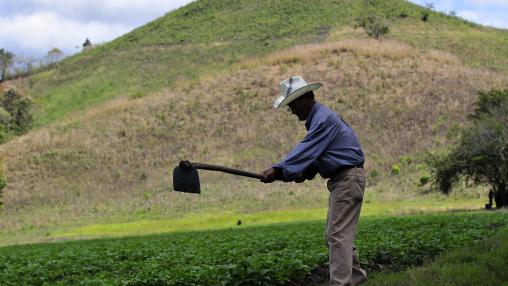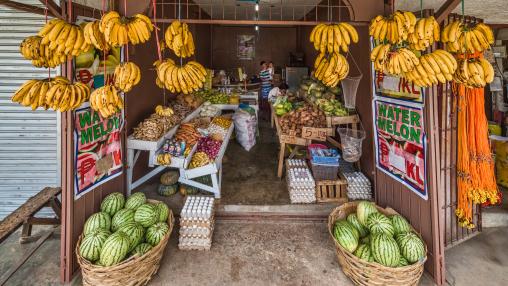Improving Diets and Nutrition through Food Systems:What Will it Take? A Dialogue on IFPRI’s 2024 Global Food Policy Report
IFPRI’s 2024 Global Food Policy flagship publication arrives at a pivotal moment, as the importance of addressing food systems for better nutrition continues to gain global recognition. With United Nations Framework Convention on Climate Change (UNFCCC) 29th Conference of the Parties taking place in November, the SUN Global Gathering on the horizon and the Nutrition for Growth Summit 2025, this report offers valuable evidence and insights that can help guide policy and investment decisions for improving nutrition at the national, regional and global levels.
Supporting and shaping the global nutrition agenda with evidence: A three-decade journey of research and partnerships for impact
This year’s Forman Lecture will be delivered by Dr. Marie Ruel, Senior Research Fellow in the Nutrition, Diets, and Health Unit at IFPRI. She served as the Director of IFPRI’s Poverty, Health, and Nutrition Division from 2004 to 2023, after serving as Senior Research Fellow and Research Fellow in that division beginning in 1996.
Debt Distress and the Right to Food in Africa
More than half of low-income countries are at risk of debt distress or have already defaulted. The debt crisis, while exacerbated by recent crises, has been looming for several years. According to the United Nations, 3.3 billion people now live in countries that spend more on interest repayments than on education or health, and in sub-Saharan Africa, governments are spending 53 percent of revenue on debt servicing.

Global Food Policy Report 2024 Latin America and the Caribbean launch: Promoting sustainable healthy diets to address diverse nutrition challenges
Malnutrition stemming from unhealthy diets is a major food systems challenge impacting the health and well-being of people around the world. High food prices, increasing availability of ultra-processed foods, urbanization, climate change, and other trends have contributed to the overconsumption of unhealthy foods while limiting the accessibility of healthy foods.
Improving Food Systems for Healthy Diets and Nutrition in Nigeria: Policies and Actions
Livestreaming will be available on this page on the day of the event.
The State of Food Security and Nutrition in the World 2024: Special Event on Financing to End Hunger, Food Insecurity and Malnutrition in All its Forms
In the lead up to the official launch of the UN's The State of Food Security and Nutrition in the World (SOFI) report on 24 July in Brazil, on 15 July 2024 from 11:00 to 13:00 (EDT), FAO and its co-publishing partners will present key messages from the report during a Special Event focused on the SOFI 2024 theme, "Financing to End Hunger, Food Insecurity and Malnutrition in All its Forms." This important discussion is taking place in the margins of the ECOSOC High-Level Political Forum (HLPF).

Risk of famine remains high in Gaza
Despite some improvements during April and May, the Gaza Strip continues to face catastrophic food insecurity with a high risk of famine, according to the latest assessment of the Famine Review Committee of the Integrated Phase Classification (IPC), released on June 25.
The IPC reports that 96% of Gaza’s population of 2.2 million people face high levels of acute food insecurity (IPC Phase 4) through September, while 22%, over 495,000 people, face catastrophic levels of acute food insecurity (IPC Phase 5).

Exploring Food Systems' Hidden Costs: IFPRI Policy Seminar
Today’s global food systems carry a hidden price tag: at least USD 10 trillion annually in environmental, health, and social costs, according to both the FAO’s The State of Food and Agriculture 2023 and Food System Economics Commission’s (FSEC) The Economics of the Food System Transformation. Globally, food systems cost more in GDP than they contribute and play a driving role in exacerbating poverty, malnutrition, and climate change.

Toward the Goal of Healthy Diets for All: 2024 Global Food Policy Report Released
The world’s food security challenges are becoming increasingly complex. In many countries, populations now face a double burden of malnutrition: both undernutrition and micronutrient deficiencies and overweight/obesity and diet-related non-communicable diseases (NCDs). These burdens are being further exacerbated by the strain placed by climate change on food supplies and nutritional content.

Transforming food systems for sustainable healthy diets: A global imperative
The impacts of our diets extend well beyond mealtime to affect our health and well-being. Unhealthy diets underpin many public health challenges, including all forms of malnutrition and diet-related noncommunicable diseases (NCDs). Many countries are facing a double burden of malnutrition—meaning that undernutrition and micronutrient deficiencies coexist with overweight and obesity, or diet-related NCDs. Unhealthy diets are the leading risk factor for NCDs, which are responsible for more than 73% of deaths globally.